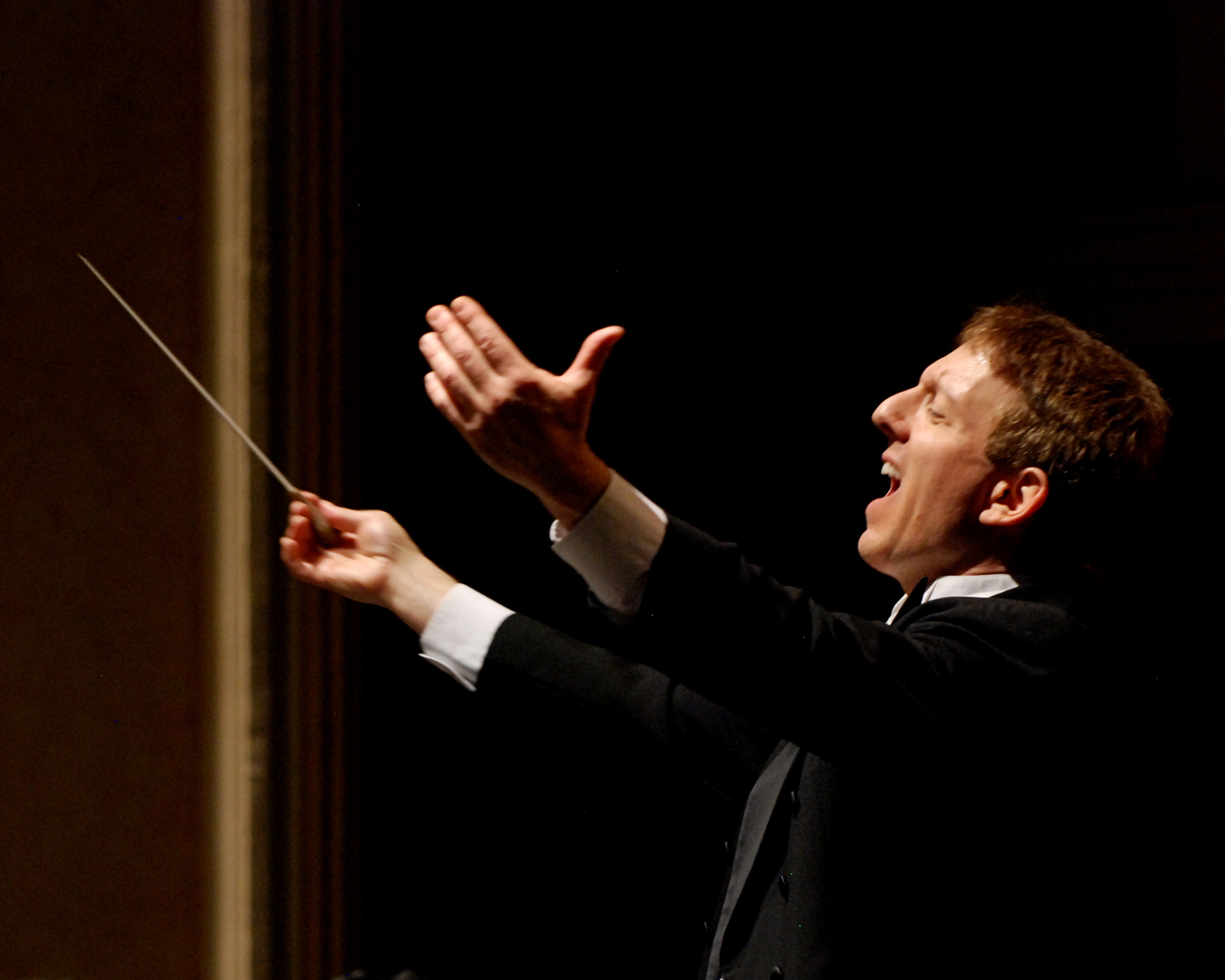
Today we’re thrilled to take a look behind the scenes, as conductor Scott Speck walks us through what it’s like to work with the score at the Joffrey Ballet. Learn more about how often the orchestra rehearses with the dancers, what Mr. Speck’s routine is like as a conductor the night of a performance, and more…
by Scott Speck
When you conduct for Joffrey, is there a routine when it comes to your approach to the score?
It’s a joy to make music for the Joffrey Ballet. This is a company that truly appreciates and even cherishes the value of live music. I attribute this largely to Artistic Director Ashley Wheater, who had extensive musical training as a child and (it turns out) seems to have perfect pitch, as he always sings the music to me in the right key! A true rarity in the ballet world.
Since I am a symphonic conductor by training, I always approach the score first as pure music. Over several months leading up to the production, I learn the form and structure of the music. I prepare to conduct as if for an onstage symphonic performance. Then I spend weeks in the studio, learning what the dancers need. It’s very helpful to have the score internalized or even memorized, since I often have my eyes fixed on the stage. The best way to achieve that is repetition! (I’ve conducted The Nutcracker some 300 times already, and it’s fair to say that conducting that score is like breathing!)
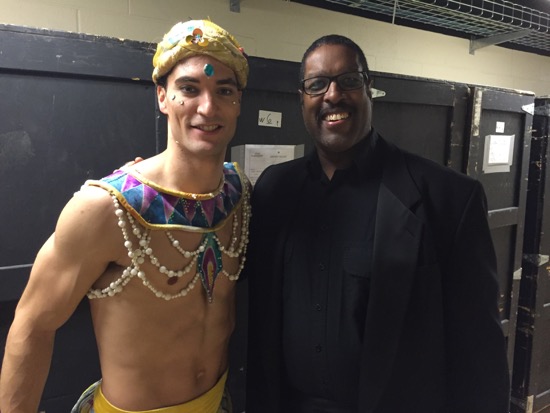
How often do you rehearse with the musicians, and where?
The Chicago Philharmonic, which always plays for the Joffrey, is a superb ensemble. The orchestra and I work together frequently throughout the year, both onstage and in the orchestra pit. As a result, the musicians and I have learned to communicate with each other very efficiently — we can almost read each other’s minds at times. So the time that we actually spend together rehearsing is quite short. For a new ballet, the musicians first learn their music on their own, and then we get together four times — twice in a rehearsal hall, and then twice in the orchestra pit, with the dancers onstage.
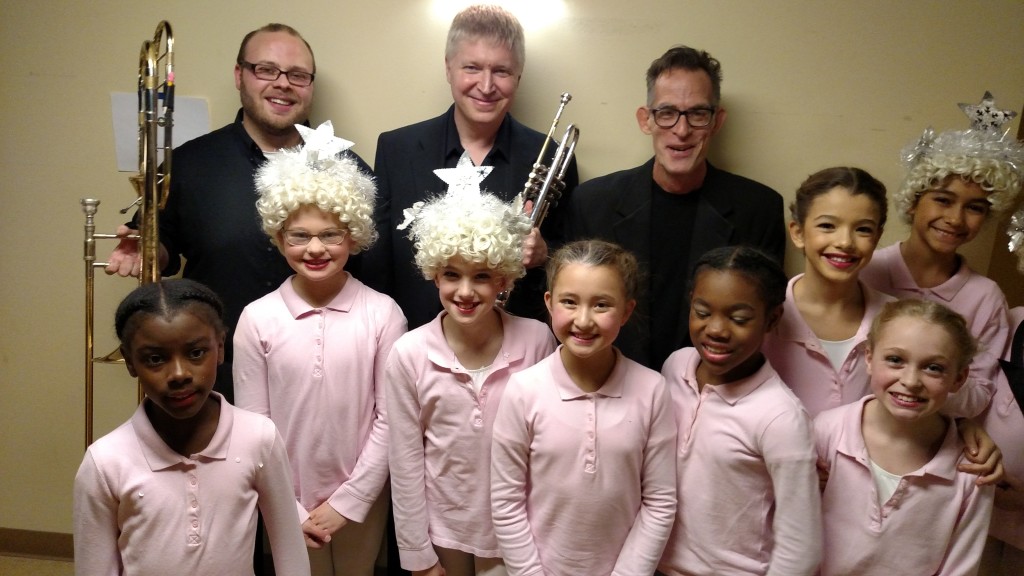
How often do you rehearse with the dancers?
Very often I will conduct the piano in the ballet studio while the dancers are learning their steps. Then, once the orchestra has learned the score, we usually have two complete run-throughs with the dancers — the orchestra tech and the dress rehearsal. Usually, after a run-through, we have time to run certain passages again, and put the finishing touches on the music. Sometimes (as in the case of The Nutcracker), we repeat a solo or pas de deux numerous times in the dress rehearsal, so that several different dancers can have a crack at it.
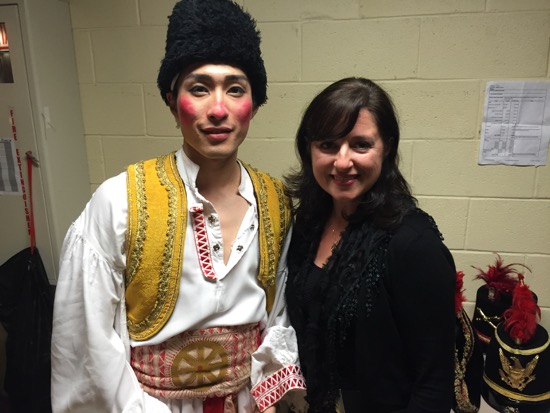
Joffrey dancer Yoshihisa Arai with violinist Daniela Folker of the Chicago Philharmonic. Photo courtesy of Scott Speck.
What is it like for you backstage? Where you you spend your time there?
The atmosphere backstage is wonderfully lighthearted and collegial. At the Auditorium Theatre, where the Joffrey performs, it’s especially fun backstage because the musician and dancer dressing rooms are on the same hallway. So it’s not unusual for me, during Nutcracker time, to see a violist, a horn player, a percussionist, twenty little girls in pink outfits and silver wigs, a trumpeter, a couple of half-clothed exotic “Arabian” dancers, Drosselmeyer, a troupe of “Russian” acrobats, and a bassoonist, all at the same time.
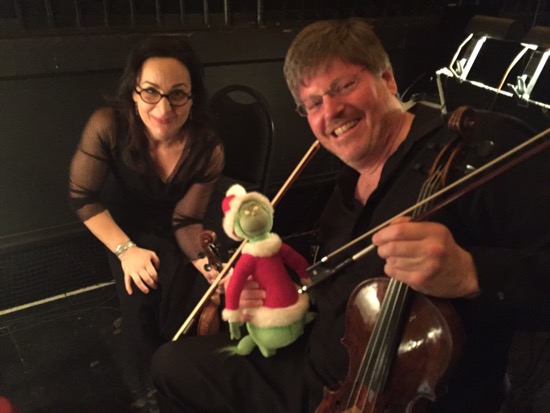
Do you have a routine on nights where you perform at the Auditorium?
I usually arrive at the theater very early. I love to walk out onstage and survey the beautiful empty hall, before it begins to fill up. I then go down my dressing room, leaf through the score, and collect my thoughts. Often I walk into the pit early, to greet the musicians as they arrive. In the case of The Nutcracker, where we have many, many different casts, I make sure I know who is dancing that night so that I can adjust our tempos for them. I also go onstage during intermission, behind the curtain, and chat with the principal couple for that show. I try to conserve energy early in the day so that I can release it during the performance — or on some days, two performances. And then, after the show — a big dinner!
What sets this theater apart from others where you have conducted?
The Auditorium Theatre is a stunning architectural marvel, designed by Louis Sullivan’s firm. It dates from 1889 and actually played a role in bringing the 1893 World’s Fair to Chicago. It was absolutely an emblem of American progress, boasting (among other things) some 3,500 incandescent light bulbs, a real novelty at the time. Incidentally, the Auditorium Theatre is also one of the biggest in the country, second only to the Met, with some 3,900 seats. It’s a thrill to conduct in a hall that not only is so beautiful but also has such a deep connection with American history and identity.
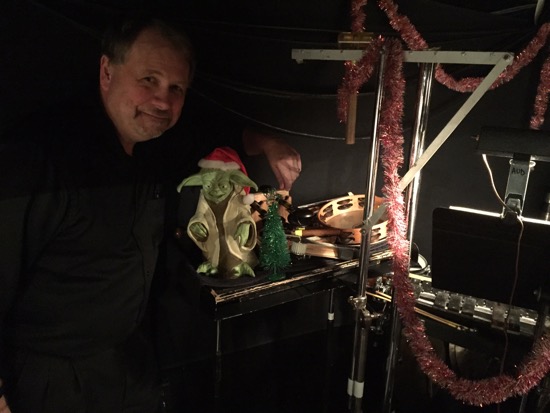
In the final moments before you go on, what do you do? What are you thinking?
I collect my energies, survey the audience from my vantage point in the pit, take a breath, savor the amazingness of what the orchestra, dancers and I are about to do together, and stride to the podium — and there is usually a tempo running in my head!
Do you have any superstitions or routines that make their way into the mix?
(Routines described above.) No, I’m not superstitious!
What do usually you do after the performance?
Eat!
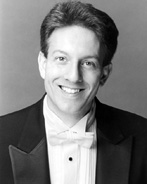
With recent performances in London, Paris, Moscow, Beijing, Chicago, San Francisco and Washington, Contributor Scott Speck has inspired international acclaim as a conductor of passion, intelligence and winning personality.
Scott Speck’s recent concerts with the Moscow RTV Symphony Orchestra in Tchaikovsky Hall garnered unanimous praise. His gala performances with Yo-Yo Ma, Itzhak Perlman, Joshua Bell, Midori, Evelyn Glennie and Olga Kern have highlighted his recent and current seasons as Music Director of the Mobile Symphony. This season he also collaborates intensively with Carnegie Hall for the seventh time as Music Director of the West Michigan Symphony. He was recently named Music Director of the Joffrey Ballet; and he was invited to the White House as Music Director of the Washington Ballet. In 2013 Scott Speck became Artistic Director of the Chicago Philharmonic.
In recent seasons Scott Speck has conducted at London’s Royal Opera House at Covent Garden, the Paris Opera, Washington’s Kennedy Center, San Francisco’s War Memorial Opera House, and the Los Angeles Music Center. He has led numerous performances with the symphony orchestras of Baltimore, Houston, Chicago (Sinfonietta), Paris, Moscow, Shanghai, Beijing, Vancouver, Romania, Slovakia, Buffalo, Columbus (OH), Honolulu, Louisville, New Orleans, Oregon, Rochester, Florida, and Virginia, among many others.
Previously he held positions as Conductor of the San Francisco Ballet; Music Advisor and Conductor of the Honolulu Symphony; and Associate Conductor of the Los Angeles Opera. During a recent tour of Asia he was named Principal Guest Conductor of the China Film Philharmonic in Beijing.
In addition, Scott Speck is the co-author of two of the world’s best-selling books on classical music for a popular audience, Classical Music for Dummies and Opera for Dummies. These books have received stellar reviews in both the national and international press and have garnered enthusiastic endorsements from major American orchestras. They have been translated into twenty languages and are available around the world. His third book in the series, Ballet for Dummies, was released to great acclaim as well.
Scott Speck has been a regular commentator on National Public Radio, the BBC, the Australian Broadcasting Corporation, and Voice of Russia, broadcast throughout the world. His writing has been featured in numerous magazines and journals.
Born in Boston, Scott Speck graduated summa cum laude from Yale University. There he founded and directed the Berkeley Chamber Orchestra, which continues to perform to this day. He was a Fulbright Scholar in Berlin, where he founded Concerto Grosso Berlin, an orchestra dedicated to the performances of Baroque and Classical music in a historically informed style. He received his Master’s Degree with highest honors from the University of Southern California, served as a Conducting Fellow at the Aspen School of Music, and studied at the Tanglewood Music Center. He is fluent in English, German and French, has a diploma in Italian, speaks Spanish and has a reading knowledge of Russian.
Scott Speck can be reached at www.scottspeck.org. You can also find him at facebook.com/ConductorScottSpeck, and @ScottSpeck1 on Twitter




